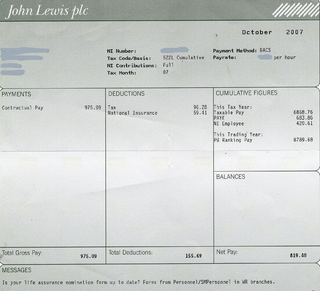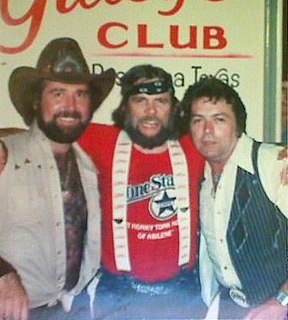
Philip Kindred Dick was an American writer known for his work in science fiction. His work explored philosophical, social, and political themes, with stories dominated by monopolistic corporations, alternative universes, authoritarian governments, and altered states of consciousness. His writing also reflected his interest in metaphysics and theology, and often drew upon his life experiences, addressing the nature of reality, identity, drug abuse, schizophrenia, and transcendental experiences. Dick produced 44 published novels and approximately 121 short stories, most of which appeared in science fiction magazines during his lifetime.
Minority Report may refer to:
Radell Faraday "Ray" Nelson is an American science fiction author and cartoonist most famous for his 1963 short story "Eight O'Clock in the Morning", which was later used by John Carpenter as the basis for his 1988 film They Live.
"Autofac" is a 1955 science fiction short story by American writer Philip K. Dick that features one of the earliest treatments of self-replicating machines. It appeared originally in Galaxy Science Fiction of November 1955, and was reprinted in several collections, including The Variable Man published in 1957, and Robots, Androids, and Mechanical Oddities published in 1984.
"The Father-Thing" is a 1954 science fiction short story by American writer Philip K. Dick. The story, told through third-person narration but focusing on the child, concerns the replacement of a boy's father with a replicated version. At first, only the child sees the difference and has to recruit other children to help him reveal the truth. The story is typical of Dick's short stories of the period.
"Rautavaara's Case" is a science fiction short story by American writer Philip K. Dick. It was first published in 1980 in Omni magazine and subsequently in the 1985 short story collection I Hope I Shall Arrive Soon. The story was also included on We Can Remember It For You Wholesale, volume five of the Collected Short Stories of Philip K. Dick in 2003.
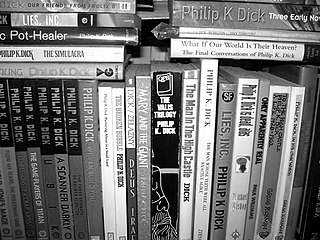
The bibliography of Philip K. Dick includes 44 novels, 121 short stories, and 14 short story collections published by American science fiction author Philip K. Dick during his lifetime.

The Best of Philip K. Dick is a collection of science fiction stories by American writer Philip K. Dick. It was first published by Del Rey Books in 1977. Many of the stories had originally appeared in the magazines Planet Stories, Fantasy and Science Fiction, Space Science Fiction, Imagination, Astounding Stories, Galaxy Science Fiction, Amazing Stories, Science Fiction Stories and Startling Stories, as well as the anthologies Dangerous Visions and Star Science Fiction Stories No.3.

The Collected Stories of Philip K. Dick is a collection of 118 science fiction stories by American writer Philip K. Dick. It was first published by Underwood-Miller in 1987 as a five volume set. See Philip K. Dick bibliography for information about the mass market reprints.
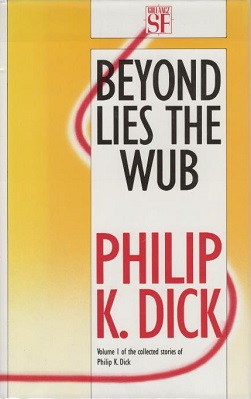
Beyond Lies the Wub is a collection of science fiction stories by American writer Philip K. Dick. It was first published by Gollancz in 1988 and reprints Volume I of The Collected Stories of Philip K. Dick. Many of the stories had originally appeared in the magazines Fantasy and Science Fiction, Planet Stories, If, Galaxy Science Fiction, Imagination, Space Science Fiction, Fantastic Story Magazine, Amazing Stories, Future, Cosmos, Fantasy Fiction, Beyond Fantasy Fiction, Thrilling Wonder Stories and Startling Stories. The collection was reprinted by Citadel Press in 2003 under the title Paycheck and Other Classic Stories.

The Short Happy Life of the Brown Oxford is a collection of science fiction stories by American writer Philip K. Dick. It was first published by Citadel Twilight in 1990 and reprints Volume I of The Collected Stories of Philip K. Dick. Many of the stories had originally appeared in the magazines Fantasy and Science Fiction, Planet Stories, If, Galaxy Science Fiction, Imagination, Space Science Fiction, Fantastic Story Magazine, Amazing Stories, Future, Cosmos, Fantasy Fiction, Beyond Fantasy Fiction, Thrilling Wonder Stories and Startling Stories. The collection was reprinted by Citadel Press in 2003 under the title Paycheck and Other Classic Stories.
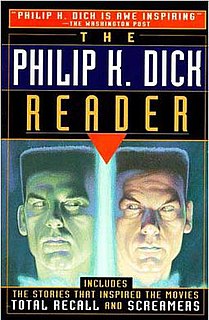
The Philip K. Dick Reader is a collection of science fiction stories by American writer Philip K. Dick. It was first published by Citadel Twilight in 1997. Many of the stories had originally appeared in the magazines If, Science Fiction Adventures, Science Fiction Stories, Orbit, Fantasy and Science Fiction, Imagination, Future, Galaxy Science Fiction, Beyond Fantasy Fiction, Satellite, Imaginative Tales, Fantastic Universe and Space Science Fiction. It is identical in content and order to the edition of volume 3 of the Collected Stories of Philip K. Dick produced by the same publisher apart from the substitution of three stories in positions 21-23 of 24 and the omission of the end notes in the Collected Stories edition. At press time, stories 21 and 24 had already been made into successful movie adaptations and stories 22 and 23 had been optioned.

Selected Stories of Philip K. Dick is a collection of science fiction stories by Philip K. Dick. It was first published by Random House in 2002. Many of the stories had originally appeared in the magazines Planet Stories, Fantasy and Science Fiction, Imagination, Space Science Fiction, Astounding, Beyond Fantasy Fiction, Orbit, Galaxy Science Fiction, Fantastic Universe, Amazing Stories, Rolling Stone College Papers, Omni and Playboy.
A mindwipe is a fictional memory erasure procedure in which the subject's memories and sometimes personality are erased. Often those are replaced by new memories more useful to those who are carrying out the mindwiping. It is a more thorough form of brainwashing. It is sometimes used as an alternative to capital punishment, or to make the subject more useful to the system. The mindwipe can be performed by a hypnotic or magical ability, or by an electronic device. It is often coupled with stories where the characters have amnesia, although the latter concept includes cases that occur naturally or by accident instead of the result of a deliberate procedure.
Tähtivaeltaja Award is an annual prize by Helsingin science fiction seura ry for the best science fiction book released in Finnish.
"The Little Movement" is a fantasy short story by American writer Philip K. Dick, first published in 1952 in The Magazine of Fantasy & Science Fiction, and later in The Collected Stories of Philip K. Dick. It has since been republished several times, including in Beyond Lies the Wub in 1988, and in 2003 in Paycheck.

For the collection of short stories by Philip K. Dick, see Beyond Lies the Wub (collection).
